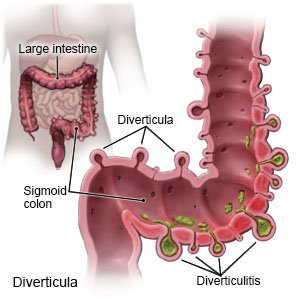Diverticulitis Diet
Medically reviewed by Drugs.com. Last updated on Apr 6, 2025.
A diverticulitis diet includes foods that allow your intestines to rest while you have diverticulitis. Diverticulitis is a condition that causes small pockets along your intestine called diverticula to become inflamed or infected. This is caused by hard bowel movement, food, or bacteria that get stuck in the pockets.
 |
DISCHARGE INSTRUCTIONS:
Foods that may be recommended while you have diverticulitis:
- A clear liquid diet may be recommended for 2 to 3 days. A clear liquid diet includes clear liquids, and foods that are liquid at room temperature. Examples include the following:
- Water and clear juices (such as apple, cranberry, or grape), strained citrus juices or fruit punch
- Coffee or tea (without cream or milk)
- Clear sports drinks or soft drinks, such as ginger ale, lemon-lime soda, or club soda (no cola or root beer)
- Clear broth, bouillon, or consommé
- Plain popsicles (no popsicles with pureed fruit or fiber)
- Flavored gelatin without fruit
- Low-fiber foods may be recommended until your symptoms improve. Examples include the following:
- Cream of wheat and finely ground grits
- White bread, white pasta, and white rice
- Canned and well-cooked fruit without skins or seeds, and juice without pulp
- Canned and well-cooked vegetables without skins or seeds, and vegetable juice
- Cow's milk, lactose-free milk, soy milk, and rice milk
- Yogurt, cottage cheese, and sherbet
- Eggs, poultry (such as chicken and turkey), fish, and tender, ground, well-cooked beef
- Tofu and smooth nut butters, such as peanut butter
- Broth and strained soups made of low-fiber foods
Drugs used to treat this and similar conditions
Flagyl
Flagyl is used to treat bacterial infections of the vagina, stomach, skin and joints. Learn about ...
Cipro
Cipro (ciprofloxacin) is a fluoroquinolone antibiotic used to treat bacterial infections. Learn ...
Ozempic
Learn about Ozempic (semaglutide) for type 2 diabetes treatment, weight management, cardiovascular ...
High-fiber foods
can help prevent diverticulosis and diverticulitis. Your healthcare provider will tell you when you can add high-fiber foods back into your diet. Examples include the following:
- Whole grains and breads, and cereals made with whole grains
- Dried fruit, fresh fruit with skin, and fruit pulp
- Raw vegetables
- Cooked greens, such as spinach
- Tough meat and meat with gristle
- Legumes, such as pinto beans and lentils
 |
Call your doctor or dietitian if:
- Your symptoms do not get better, or they get worse.
- You have questions about the foods you should eat.
- You have questions or concerns about your condition or care.
© Copyright Merative 2025 Information is for End User's use only and may not be sold, redistributed or otherwise used for commercial purposes.
The above information is an educational aid only. It is not intended as medical advice for individual conditions or treatments. Talk to your doctor, nurse or pharmacist before following any medical regimen to see if it is safe and effective for you.
Further information
Always consult your healthcare provider to ensure the information displayed on this page applies to your personal circumstances.
